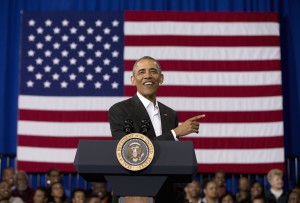
It used to be that death and taxes were the only certain things in life, but for President Barack Obama there is a third: Michelle Obama will not run for president.
With Obama now in his final year in office, the focus naturally has shifted to who will succeed him. At a town hall event Thursday with Louisiana residents, Obama was asked if there’s any chance he could talk the first lady into running.
His answer? An emphatic “no.”
“There are three things that are certain in life: Death, taxes and Michelle is not running for president,” he said. “That I can tell you.”
A dozen Republicans and three Democrats are in the running to succeed Obama next January, but speculation seems to be returning to whether Mrs. Obama would ever run, despite her previous declarations that she would have to be crazy to do so.
Obama praised his wife of 23 years for her work to reduce childhood obesity, as well as her efforts with Jill Biden, the vice president’s wife, to help military families. He said he was certain she would stay active after leaving the White House, and launched into a riff on her youthful appearance compared to his head of grey hair after seven years in office.
“Not only is she going to be a very young ex-first lady, unlike me, she looks young,” Obama said.
He said they recently watched video of their 1992 wedding and he realized “boy, I sure have aged. But Michelle, she looked identical.”
Obama’s stop in Baton Rouge was part of his tradition of getting out of Washington after delivering his State of the Union address. He visited Omaha, Nebraska, on Wednesday, the day after the speech. The White House says he wants to spend more time in the company of real people.
Before taking questions, Obama praised the decision by Louisiana’s new governor, Democrat John Bel Edwards, to expand Medicaid in his state. Several hundred thousand Louisiana residents stand to benefit, according to Edwards’ office.
“He’s already delivering for the people of Louisiana,” Obama said.
Edwards’ predecessor, Republican Bobby Jindal, had refused to expand the program on grounds that it would be too costly for the state.
Obama said Edwards’ decision “shows you why elections matter.”
Obama’s health care law allows states to use federal money to expand Medicaid to provide coverage to more of the working poor. The federal government pays the full cost of expansion through 2016, gradually dropping to 90 percent in 2020 and after.
Thirty other states and the District of Columbia have accepted Washington’s offer to pay the full cost of expanding Medicaid, but more than a dozen mostly conservative states have not. It’s a situation Obama hopes to change before he leaves office.
In an attempt to encourage holdout states to follow Edwards’ lead, Obama will ask Congress to provide full federal funding for the first three years after states expand their programs. That means any state that expands Medicaid this year — currently the final year for full federal funding — or any year after would get Washington to pay 100 percent of the costs for the first three years.
The White House said the proposal will be in the 2017 federal budget plan Obama is sending to Capitol Hill next month.
Obama also urged Louisianans to support Edwards, who took office this week.
“He’s coming in a little like I came in … got to clean up some stuff,” Obama said, referring to his experience taking office during the worst economic downturn in generations.
In Edwards’ case, he faces a shortfall of more than $700 million for the remaining six months of the current budget year. The gap widens to an estimated $1.9 billion next year.




